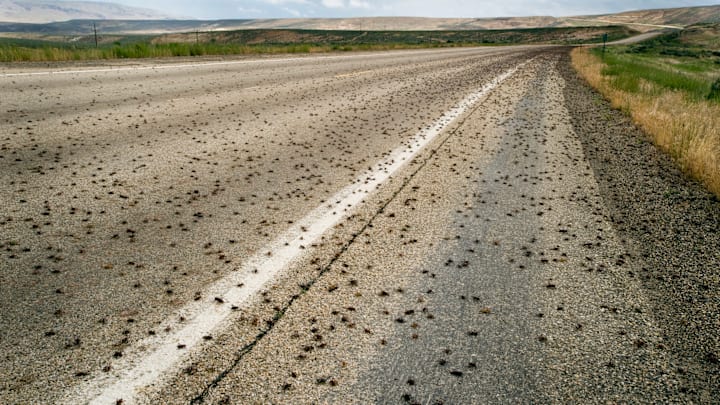The phrase Biblical plague can sound like hyperbole, but when your state is dealing with an infestation of cannibal crickets, it may begin to sound like an understatement. That’s the problem facing Nevada, as millions of so-called “Mormon crickets” are currently causing concern and repulsion.
According to USA Today, the flightless creatures are emerging from years of dormancy and creating serious obstacles in parts of the state due to their congregating and tendency to excrete feces. The insects are infesting areas near buildings, highways, and even healthcare facilities. It has also been alleged they will eat the stucco off a house.
“Just to get patients into the hospital we had people out there with leaf blowers, with brooms, at one point we even had a tractor with a snowplow on it just to push the piles of crickets and move them on their way,” Steve Burrows, director of community relations at Northeastern Nevada Regional Hospital, told KSL TV.
The Mormon cricket is not really a cricket at all but a 2-inch long katydid that devours grass and contributes to soil erosion. Their name comes from their wanton destruction of Mormon settler land in Utah, back in the 1800s.
That the bugs are cannibals and will devour one another if no other food source is available is only contributing to the problem. The result can be a gruesome scene of sprinting insects and half-eaten corpses. Walking on them is said to be similar in sensation and sound to stepping on popcorn. When the bugs expire on a roadway, they can actually cause accidents, as their slick entrails create a slippery surface for vehicles.

“They get run over, two or three come out and eat their buddy and they get run over and the roads can get covered with crickets and they can get slick,” Jeff Knight, an entomologist for the Nevada Department of Agriculture, told Nevada news affiliate KSL. “The bigger issue is these afternoon thunderstorms and put a little water on that and it gets slick ... we’ve had a number of accidents caused by crickets.”
Knight said the hordes can travel about a mile a day, though they may hang out at one site for up to four days. Residents horrified by the insects crawling up their walls will have to just wait it out, though that may take a while. The current infestation began in 2019 and may persist owing to the region's cricket-friendly drought conditions.
